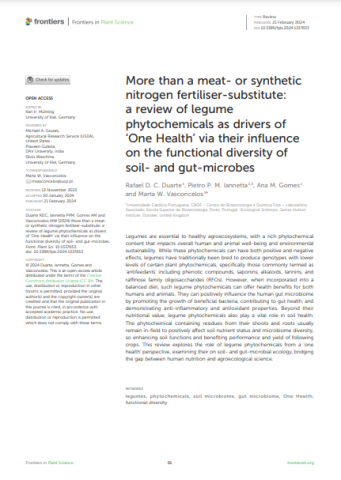Abstract:
Legumes are essential to healthy agroecosystems, with a rich phytochemical content that impacts overall human and animal well-being and environmental sustainability. While these phytochemicals can have both positive and negative effects, legumes have traditionally been bred to produce genotypes with lower levels of certain plant phytochemicals, specifically those commonly termed as ‘antifeedants’ including phenolic compounds, saponins, alkaloids, tannins, and raffinose family oligosaccharides (RFOs). However, when incorporated into a balanced diet, such legume phytochemicals can offer health benefits for both humans and animals. They can positively influence the human gut microbiome by promoting the growth of beneficial bacteria, contributing to gut health, and demonstrating anti-inflammatory and antioxidant properties. Beyond their nutritional value, legume phytochemicals also play a vital role in soil health. The phytochemical containing residues from their shoots and roots usually remain in-field to positively affect soil nutrient status and microbiome diversity, so enhancing soil functions and benefiting performance and yield of following crops. This review explores the role of legume phytochemicals from a ‘one health’ perspective, examining their on soil- and gut-microbial ecology, bridging the gap between human nutrition and agroecological science.
Duarte RDC, Iannetta PPM, Gomes AM and Vasconcelos MW (2024) More than a meator synthetic nitrogen fertiliser-substitute: a review of legume phytochemicals as drivers of ‘One Health’ via their influence on the functional diversity of soil- and gut-microbes. Front. Plant Sci. 15:1337653. doi: 10.3389/fpls.2024.1337653
Download the article below.



